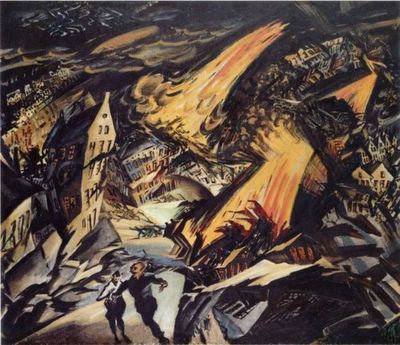
Over at
Peak Energy, Monkeygrinder has an excellent and sobering post on the need to strike a balance between realistic pessimism and realistic hopefulness, without falling prey to the lures and snares of
terriblisma on the one hand, and complacent optimism on the other.
I've been thinking about the questions he raises for a couple of days now. I have no solutions, but I
do have lots of disorganized and probably irrational thoughts. (What a shock, eh?)
The painting above, since you asked, is called
Apokalyptische Landschaft. It was painted by
Ludwig Meidner, way back in 1912. Meidner's era, like ours, aestheticized catastrophe to a remarkable extent, and Meidner was one of those melancholic artists who saw destruction as horrible but necessary, given the degraded state of the world. His contemporaries in the Italian Futurist movement, by contrast, called war "the world's only hygiene" and celebrated the idea of destruction as a noble goal in and of itself. To them, destruction was not merely punitive or cathartic, but something more akin to a spiritual duty.
In this dichotomy, I think we can see hints of today's divide between the devotées of terriblisma on the Left and Right: very generally speaking, left-wing melancholics tend to feel that destruction will punish or cleanse them, while right-wing militants believe that being
agents of destruction will exalt them. Both hopes, I suspect, come from a similar dissatisfaction with a way of life that lacks meaning. Both groups, though they turn their weariness with the status quo in radically different directions, are basically saying "If the world must end, let's get it over with; the suspense is killing me." (And they're right, too...it
is killing them. We might - with a nod to the irritating crypto-teleological sophistry of Richard Dawkins - call an organism in this state "Something Eager to Die.")
I assume that anyone who's reading this doesn't
want the world to be violently, gruesomely transformed a la Meidner or the Futurists, no matter how likely or even inescapable that fate might seem. In this regard,
Rorschach has aptly quoted Gramsci's call for "pessimism of the intellect, and optimism of the will." And as a personal stance, that's pretty close to ideal in my book (though the intellect does have a knack for undercutting the will, as I know all too well).
As a public, rhetorical stance, though, I'm afraid it's insufficient, and possibly counterproductive. There's a real longing for upheaval and catastrophe in some quarters, and horror stories about the future - even if they're intended to shock people into awareness - may amount to little more than fuel for that fire. Fortunately, there's more to people and societies than the urge to punish and be punished, to kill and be killed; if there's hope for us, I believe it lies in disavowing pessimism, catering to healthier societal urges, and turning unhealthy urges in more constructive directions.
I argued a few months ago that
powerlessness corrupts, and I really feel this is a truth that can't be overstated. To the extent that we encourage a sense of powerlessness, we push people towards the emotional adaptation of aestheticizing or spirtualizing or otherwise justifying disaster. It may even be that the current epidemic of gleefully destructive moral nihilism on the Right is partially a response to the warnings of impending ecological or nuclear disaster promulgated by the Left in decades past. Who knows? At any rate, it seems obvious that Americans
do feel powerless. They're looking for something to fill this void...and when they can't beat it, they join it.
In answer to Monkeygrinder's question, I don't know what might "save" us from the problem of peak oil (or any other looming disaster). But I do know we need a strong public demand for progress, and a general willingness to make sacrifices. We have thousands of people in this country who were willing to give up their own lives, or the lives of their sons and daughters, for Bush's cruel hoax of a war. If that degree of commitment could be refocused on something useful, much smaller sacrifices could have much more positive results.
Therefore, I think the main issue here is one of framing. The Right needs to be seen by the popular mind as a group of people who stand in the way of something new and exciting. We need to convince people that there's a brighter, more interesting world right around the corner, and that the main thing keeping us from reaching it is a relatively small group of greedy people who lack vision and wisdom.
Of course, we might not find a technological fix for our energy problems. But the more years we can squeeze out of whatever oil's left, the better our chances are. In my opinion, the chance that we'll solve at least part of the energy problem in the next twenty years is far better than the chance that we'll have a working space-based missile defense program in the next fifty.
Therefore, we need to encourage conservation. But does this mean we need to advocate it on the basis of an apocalyptic peak-oil scenario? I don't think so...or at least, not always. The one-issue mindset limits our ability to be effective advocates for change. There are other, more effective types of leverage than fear of calamitous social breakdown...especially when so many people dislike the society we've got, and may have a secret wish to watch it collapse.
On the Left, we tend to focus on issues that we feel should be of interest to responsible adults. But America is not entirely a nation of responsible adults. There's nothing wrong with pointing out, on occasion, that BushCo is denying us not just clean air and water, but
more fun and
better toys.
The Right has had a lot of success painting us as puritanical killjoys. But all you have to do is look at sites like
Treehugger,
Metaefficient,
Boing Boing, and
Near Near Future to see that, in fact, it's the cheap-labor, anti-competition, scaremongering blowhards of the Right who are the
real killjoys. They're not just enemies of biodiversity; they're also enemies of technological and scientific diversity, and they're robbing us of all sorts of interesting and attractive products and possibilities.
There are other forms of leverage, too. The epidemic of obesity among the working population, which costs employers a fortune, could conceivably be used as justification for redesigning residential areas or workplaces in ways that would,
coincidentally, reduce dependence on automobiles. For instance, employees who bicycle to work might receive, say, 20 minutes of vacation time per day. In a year, they'd earn an extra two weeks of vacation time. The incentive here has nothing to do with peak oil, but it has a real effect, however modest, on both conservation and air quality.
As I said, these are very disorganized thoughts. But I do think that if we can't come up with a miraculous solution like cold fusion, we need an innovation economy that produces lots of
little solutions, and promotes cooperation between experts - and amateurs - in many different fields. Meanwhile, on the rhetorical level, we need to give people hope, and a personal stake in seeing the world change. If a certain amount of apocalyptic thinking comes from emotional dissatisfaction with what passes for life in these United States, then we need to make people eager for a more wholesome form of "regeneration" than fascism offers. As it stands now, I'm afraid that apocalyptic scenarios are simply too emotionally attractive to have any reliable transformative power. As odd as it sounds, we're simply going to have to offer people something a bit more fulfilling than the end of the world.




